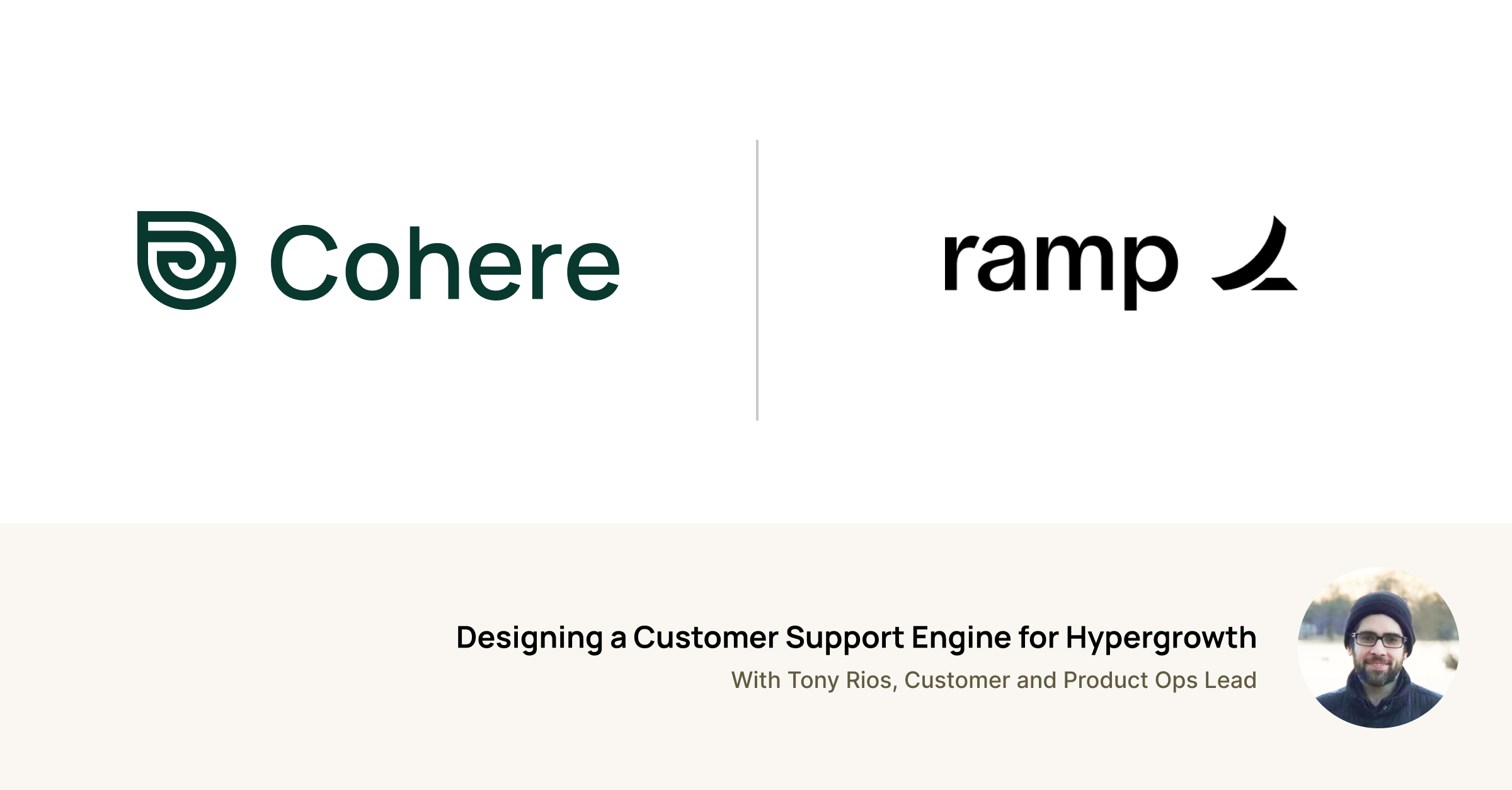
Tony Rios leads customer and product operations for Ramp, the corporate card and finance automation platform designed to help companies save money.
Last year, the team raised $300 million in Series C funding and saw its client base grow to 1,000+ companies, including Eight Sleep, Bev, WayUp, and Planned Parenthood.
We sat down with Tony to dive into his experience of growing support and product ops engines for one of the leading players in fintech. We cover topics including:
- How optimized customer support engines become revenue centers
- Maintaining high-quality onboarding in the age of remote workplaces
- Why internal support structures are crucial to external support services
"As a customer support unit, we’re hyper-focused on uniting and iterating based on both qualitative and quantitative data. One of our mantras is that every inquiry is an opportunity to improve the product — and we take it to heart."
Scaling Customer Support & Product Operations
Throughout his first year at Ramp, Tony has scaled two teams:
- Customer support — Primarily scaling support tooling, streamlining self-service flows, and systematizing support efforts through repeatable processes
- Product operations — Enhancing data workflows around Zendesk support tickets and working alongside product management teams to improve user-facing products
In addition, he spearheaded initiatives to continue driving support efficiency and growth, including the redesign of 200+ FAQ pages on the Ramp site to provide visual — rather than content-heavy — walkthroughs, in response to the 60% of support tickets inquiring about topics that are buried in help articles.
Overall, Tony boils his role down to identifying and ironing out operational inefficiencies and whatever won’t scale, while simultaneously introducing new elements, like self-service or automation, to alleviate compounding workloads.
Customer Support as a Revenue-Generating Engine
As Tony recounts, the people behind Ramp’s user support had long felt their efforts were somehow driving acquisitions, customer spend, as well as retention for the larger company.
After a data collection period, they conducted internal research on the idea — and the numbers demonstrated that they were correct.
More specifically, they discovered three main concepts that illustrated the full impact of Ramp support ops on overall revenue:
- Clients who utilized self-service were more likely to contact customer support.
- Businesses that came in greater contact with customer support i.e. initiated contact on 3+ instances, generated more revenue for Ramp than their counterparts who didn’t contact customer support at all.
- As such, customer support at Ramp is understood as a revenue center and avenue for user activation.
"The strategy was always to provide high-speed, high-quality support for Ramp users. The data just organically followed, saying we are indeed a net positive for the company in terms of customer spend and retention."
How Ramp Optimized Remote Onboarding
In terms of the greatest impact of the pandemic and remote work for the Ramp team, Tony pointed to the training and onboarding of new employees.
After all, certain integral aspects of Ramp’s support engines had to be completely rewritten or discarded after migrating online. For instance:
- New support team members frequently shadow their experienced counterparts to learn the day-to-day motions, how to interact with B2B customers, what tools and internal knowledge to leverage, and so on.
- The average support worker possesses a breadth, rather than a complex depth, of knowledge about the Ramp platform.
For instance, a helpline agent aiding a CFO with a Quickbooks integration would normally be able to turn to a more specialized coworker nearby — an option that’s no longer possible due to the disconnected nature of remote work.
In response, Tony attempted to ameliorate the impacts of losing a shared, in-person work environment, primarily by:
- Recreating the experience of onboarding through shadowing, where new hires work alongside team members who share their screens while working through tickets
- Hosting de facto office hours throughout the workday for team members to drop in and request guidance on difficult tickets
In Tony’s words, support work — even with an in-person support network — can be grueling.
As a result, his approach to building team culture has long been influenced by one concept: No employee should have to struggle or suffer in silence.
"Building a positive culture is harder for support teams because you’re handling eight hours of non-stop problems. So being able to scale remote personnel while also maintaining avenues for internal support has been huge."
Getting Ahead of Hypergrowth
When asked how he’d built out a support team today, from zero to one, Tony emphasized the importance of preparing for potential company hypergrowth — as was the case for Ramp.
The company has grown by 10+ people since he joined last year, but Tony concedes this hasn’t kept up with the reality of their customer base, as well as their support ticket count, growing by 20% month after month.
As such, Tony would advise any support team leader to conduct realistic headcount projections, to avoid his struggle of being understaffed at crucial points of that growth stage.
He also warns of another severe blocker: support team burnout.
Again, he returned to his mantra for team-building — “No team member should struggle in silence” — and has strived to create an environment where employees feel safe in practicing transparency and admitting feeling overwhelmed by workloads.
This can be practiced in small approaches to leading by example, such as:
- Jumping in, as a manager, to offer to support workloads
- Encouraging PTO and a larger work-life divide, so team members can find time for turning off all thoughts of Ramp support
On a larger scale, Tony feels these blockers can also be addressed by, in his words, simply being your team’s biggest champion.
Tony admits it’s taken a number of months to instill that culture of agency and confidence in impact within his team members — and he encourages every support team leader to begin facilitating that culture from day one.
"Creating a positive culture pays dividends down the line. I’d start by encouraging people to always ask for help when they need it, as well as by making sure they see the high value they bring — to the company and to the users."
